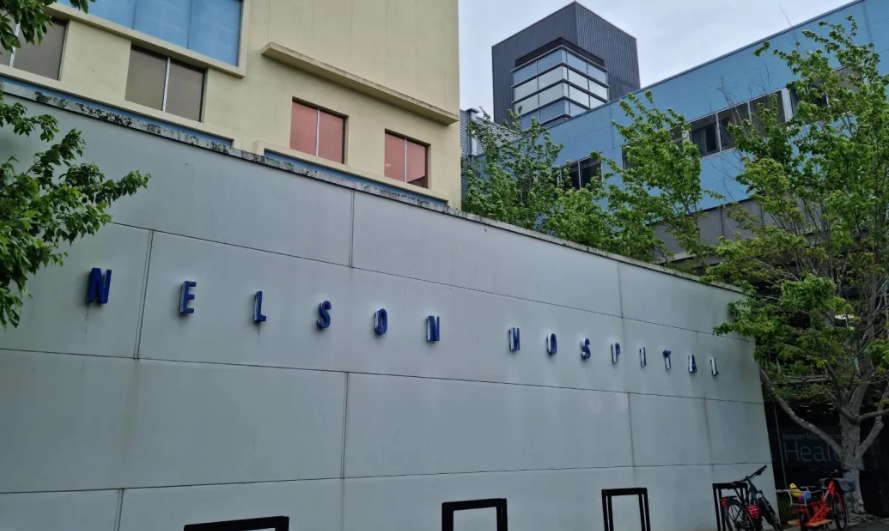
Workers at Nelson Hospital say the conditions are unbearable, with temperatures sometimes getting over 30°C inside, and mouldy window sills.
Staff talk of sweat dripping down their backs and feeling faint and nauseous after a day of work.
One worker said conditions are so bad they had chosen to taken redundancy and are moving to Australia because they could not bear to work there anymore.
The previous Labour government had signed off a full rebuild of Nelson Hospital, but the plan has now changed, and may now be for several new smaller buildings and some of the existing infrastructure kept.
A government review of clinical hospital facilities in 2020 found the George Manson Building, which is part of Nelson Hospital, to be the worst in the country.
RNZ has been in contact with four workers from Nelson Hospital, who all asked to remain anonymous.
One worker said the building is decrepit and falling down around them.
"The heat is at times absolutely unbearable. We have sweat dripping down our backs, just sitting in the office trying to do our work, headaches, extreme fatigue and the response that we get from management is: 'Oh there is a plan, there's a plan'. Yet there's never a plan that comes to fruition and there's never any actions that follow the words.
"So I think a lot of people are really frustrated and really disheartened, especially with the current climate that we're in with Health New Zealand to see just how little staff matter to them. You know, putting us in difficult and sometimes unbearable conditions."
The worker said the conditions also leave patients uncomfortable, with some saying they feel faint and nauseous.
"If somebody is unwell with a fever, we don't have a lot of spaces where we can move them. We've only got a couple of single rooms that we can keep a little bit cooler. So that's a real issue , patients obviously being unwell and not being able to care for them correctly."
The worker said attempts by Health New Zealand to resolve the problem, with portable air conditioning units, and maintenance work to fix ageing infrastructure, were not good enough.
"It's a Band-aid. It's a Band-Aid on a broken bone."
The second worker said the conditions were the worst they had encountered in their career - and the reason they had opted for voluntary redundancy.
"You're in the stifling hot, so you open all the windows. But if it's a windy day, the ceiling falls down because its not secure. So that has happened twice now, where the ceiling has fallen down and crashed down on a desk."
The worker said that every day they have to wipe mould off window sills and their desk.
The third worker said the problem also causes issues for patients, who often complain about the heat.
"Patients when they're coming back from theatre, it's common for them to have like that post op fever anyway, but even more so when you've got a really hot environment. That escalates it as well. So patients are really uncomfortable. It does create like issues with patients feeling like they want to faint because it's just a hot environment."
They said they also have to deal with windows that would not open, or would not shut properly.
"If it rains, we have to put towels up against the windows because they will leak."
The fourth worker also described windows that would not shut and rain pooling on the ground.
The worker said it was not uncommon for the areas to be as warm as 28°C inside.
All of the workers mentioned multiple complaints being filed with the district health board in the past, and Health NZ/Te Whatu Ora now, but no actions taken to fix the problem.
One said the lack of any timeframe for when issued would be resolved is particularly frustrating.
"All that Health New Zealand seem to do is they say there's something coming. Yet there's no resolve for it in the meantime. And that 'something coming' never seems to happen anyway, so it's just one big long of - be patient, be patient, be patient."
Te Whatu Ora's regional head of infrastructure, Te Waipounamu, Dr Rob Ojala said they have received some complaints over the last year about the air conditioning in two of the buildings at Nelson Hospital.
"The air conditioning in the George Manson building is functioning but upgrades are happening alongside the seismic strengthening programme. There are portable aircon units in some rooms. The air conditioning system in the Percy Brunette building is also ageing.
"Our facilities team maintain all the air conditioning units on a regular planned schedule and make repairs as soon as they are notified of any issues - we encourage all our staff to let us know about issues they are having with the air conditioning so that these can be fixed promptly."
Windows were also repaired immediately when issues are reported through to the facilities team, he said.
"The windows and air conditioning systems are programmed for replacement as part of the redevelopment of the hospital but we will continue to maintain our current facilities while the redevelopment is under way."
Ojala said Te Whatu Ora follows WorkSafe's guidance on thermally comfortable work environments and clinical teams can also request varying temperatures depending on patient care requirements.
He said they were on track to present the Nelson Hospital redevelopment detailed business case for consideration by Ministers in early 2025.













